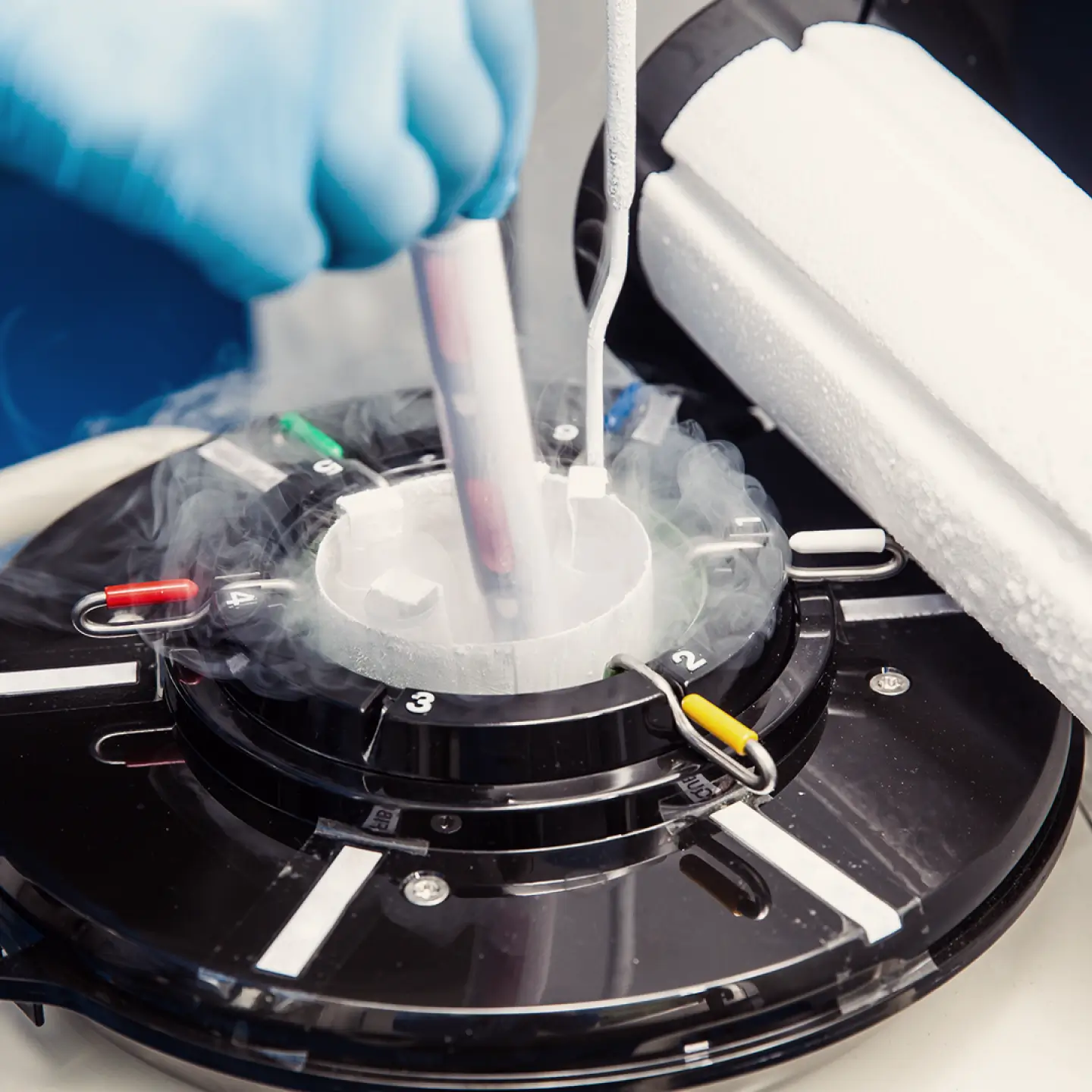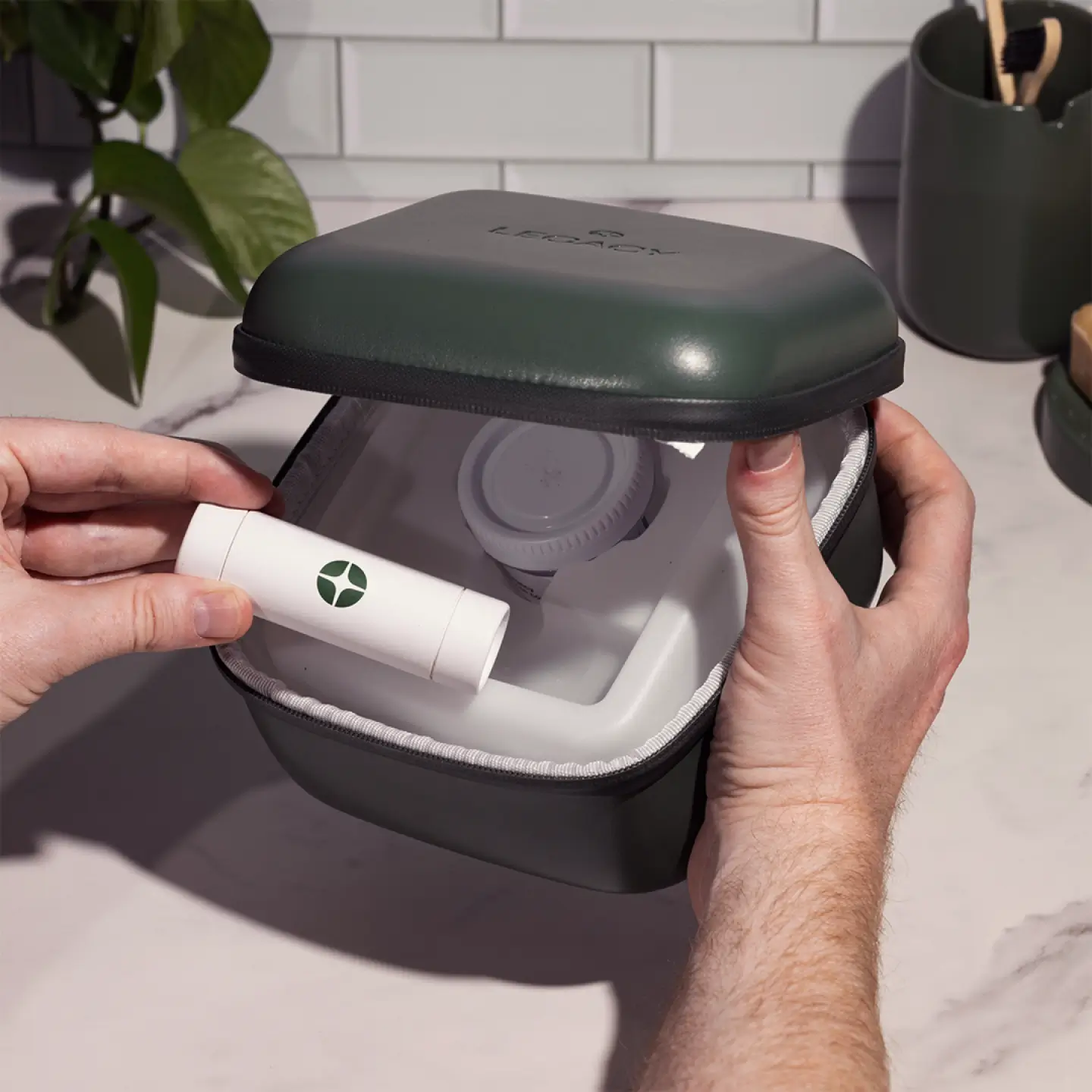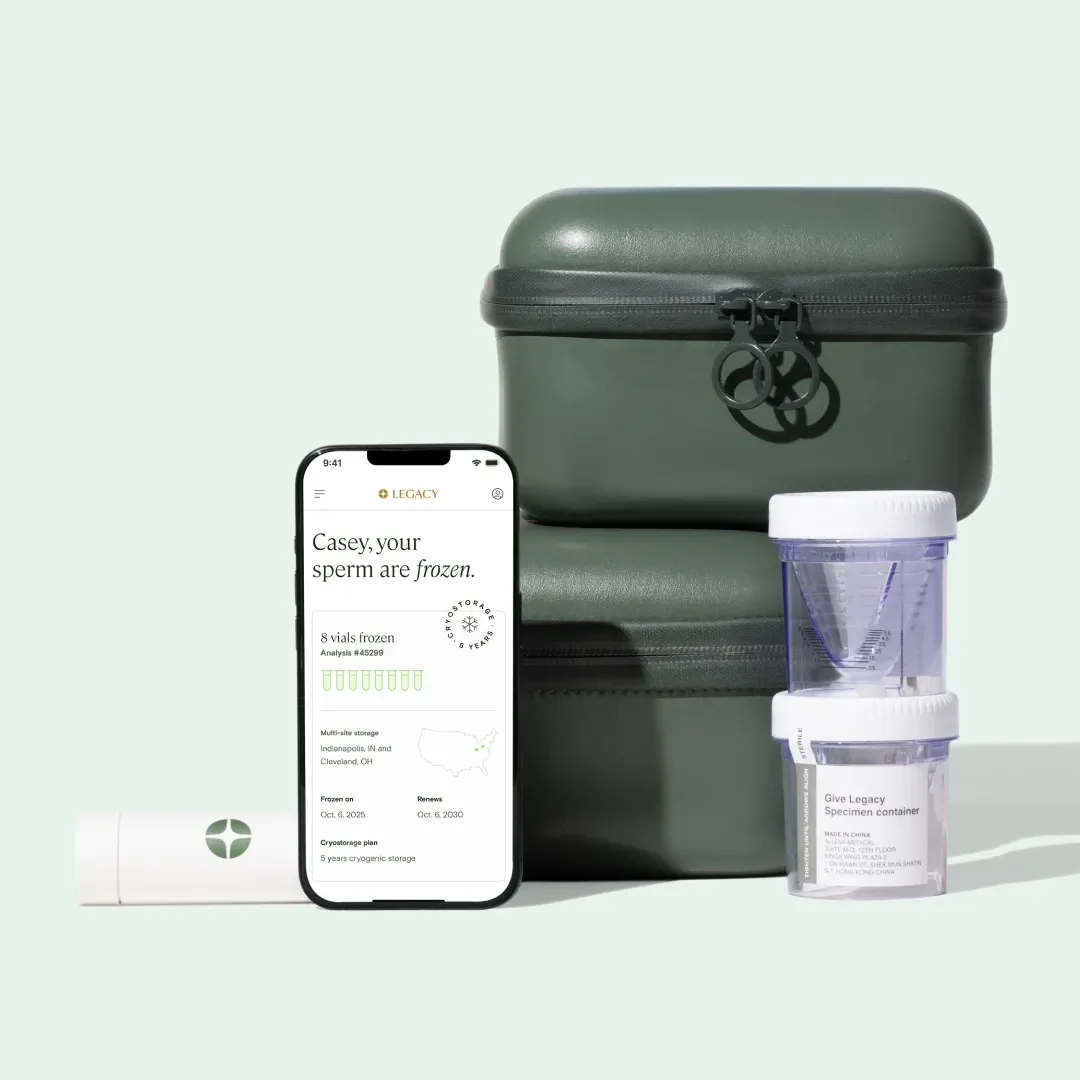
Done in 48 hours
Free shipping
CLIA-certified lab



Done in 48 hours
Free shipping
CLIA-certified lab
4.9/5 on Google
At-home sperm testing & sperm freezing kit
Our at-home sperm testing kit allows you to test your sperm and store sperm for later use. Collect a sample at home, mail the kit back to our lab, get your results, and freeze your healthy sample with flexible and affordable sperm storage plans.
Do you want to freeze sperm for later use?
Renewable short- and long-term sperm storage plans. You can retrieve your sperm at any time.
How many at-home sperm collection kits do you need?
Each kit collects one sample, which we will fully analyze. We recommend storing multiple samples if possible.
1 kit
2 kits
3 kits
Include DNA Fragmentation?
This test measures how many sperm carry damaged DNA. High levels contribute to infertility and miscarriage.
Yes +$275
Not right now
Standard analysis only

Include a pre-freeze STI test?
If you’re freezing sperm, we recommend STI screening so you can use your sample at a clinic in the future.
Yes + $150
I’ll get one on my own
Save 60%!
$5,432
(Avg. clinic cost)
$2485
5 years freezing, 3 samples, + 1 STI test
You may be eligible to pay $0 out of pocket. Explore savings & benefits
Need help? Talk to an expert 617-514-0901
Frequently asked questions
The Legacy kit includes:
- A sterile sample cup to easily collect your sample from home
- The Legacy “vault,” an insulated zippered container that maintains a stable temperature during transportation
- The sperm transport liquid — a vial of pink fluid — to keep sample viable during shipping
- A tamper-proof padlock to seal the vault securely
- Free overnight shipping to send your sample to our lab for analysis
You should consider at-home sperm analysis if:
- You’re trying to grow your family
- You’re planning fertility treatment
- You’re taking a medication that may affect fertility
- You want to understand your health
- You want to keep your family-building options open
Read more about why at-home sperm testing could be right for you.
We offer more than just a sperm count test. Legacy’s at-home sperm analysis is a clinic-grade semen analysis without the clinic. It looks at all the key metrics of sperm health, including semen volume, sperm concentration, sperm motility, total motile sperm count, sperm morphology, and sperm DNA fragmentation.
Many at-home sperm testing options don’t look at sperm motility or morphology, which are important parameters. We’re the only at-home sperm freezing option that includes a post-thaw analysis, in which we freeze and thaw a small portion of your sample to assess if it’s a good candidate for cryopreservation (sperm freezing).
Your male fertility test report is delivered to your personalized client dashboard. It includes more than just the numbers — it’ll tell you what those numbers really mean for you and your family-building plans.
Your dashboard includes:
- Evidence-based recommendations for improving your fertility health, based on your results and lifestyle
- Exclusive access to book a virtual appointment with one of our male fertility specialist medical providers, to discuss your results and possible next steps
- A downloadable semen analysis summary to share with your doctor
- Information about your frozen sperm, including their location and next steps to withdraw and transfer your sample
Legacy’s semen analysis kit has been clinically validated. Our research team has compared the results of our kit to a conventional, in-person semen analysis and found no significant difference. There is likely to be a slight decline in sperm motility when using mail-in kits because of time spent in transit.
Legacy at-home semen analysis begins at $295. The cost at a traditional clinic can range from $250 to $500, and it requires a prescription from a doctor.
Legacy’s at-home semen analysis with sperm DNA fragmentation testing starts at $570.
You should consider sperm freezing and sperm storage for future use if:
- You want to keep your options open for the future
- You want to have the healthiest possible family
- You’re about to start a medical treatment, such as hormone therapy or chemotherapy
- You’re planning to have a vasectomy
- You’re in a profession with a high risk of injury or chemical exposure, such as the military or firefighting
Learn more about sperm freezing.
Research has found that sperm can essentially be frozen indefinitely as long as it’s preserved at an appropriate temperature. (Legacy uses liquid nitrogen to freeze your sample at -196ºC.) A National Institutes of Health study reported that three different samples of frozen sperm had produced healthy pregnancies via assisted reproductive methods after 21, 28, and 40 years of freezing, respectively.
With Legacy, long-term sperm storage is more affordable than at a traditional clinic. Five years of storage costs $119 per sample, per year. How much does long-term sperm storage cost? The longer you store, the more you save: 25 years of storage costs $35.53 per sample, per year.
That compares to about $500 per sample, per year, at a traditional clinic
You can use your frozen sperm by transferring it to a healthcare provider or clinic for assisted reproductive methods such as IVF (in vitro fertilization) and IUI (intrauterine insemination). Transferring your sperm from Legacy to a qualified provider is easy; you can start the process with a few clicks in your client dashboard.
Each Legacy kit collects one semen sample. At our lab, each sample is divided into 4 vials of sperm — that’s up to 4 tries to get pregnant utilizing IUI or IVF. Generally speaking, it takes 2–4 rounds of assisted reproductive treatment methods to create a pregnancy. So we recommend buying one kit for each child you hope to have in the future.
Studies have found that frozen sperm produces pregnancy and live birth rates equal to fresh sperm. That is true regardless of the assisted reproductive technology — IUI, IVF, or ICSI — used. Read more about how sperm freezing affects sperm quality.
If your analysis reveals that your sample isn’t viable for freezing — for example, if no sperm was found in your sample — you have a few options. You can speak to one of our male fertility specialists to understand what may be affecting your fertility, as well as some next steps you may want to take. You also may want to re-test to confirm any abnormal results.
Don’t worry: if your sample is deemed not viable for storage by our lab, we’ll refund you for the storage plan you purchased as well as any unused services, such as additional testing that could not be performed.
From prep to results, it can take less than a week. You should abstain from ejaculating for 2–5 days before using the kit, and you should only return your sample between Monday and Thursday. Each kit includes free overnight shipping back to our lab. Your results will be available in your online dashboard within 48 hours of our lab receiving your sample.
Legacy’s kit includes a liquid transport medium that, when mixed with your semen sample, keeps sperm alive during shipment to our lab for testing.
Legacy uses liquid nitrogen to freeze your sample at -196ºC. After your sample is analyzed at our lab, it is divided in two, frozen, and stored in two separate geographical locations to protect against natural disasters.
Legacy is in-network with leading health insurance plans and fertility benefits providers. You may be able to test and freeze your sperm for up to 100% off, depending on your plan.
Yes. Some Legacy products and services are eligible for reimbursement via flexible spending accounts (FSA) and health savings accounts (HSA), including sperm testing and freezing.
Legacy is committed to supporting military families through special discounts and partnerships with organizations including We Salute, Military Family Building Coalition, Operation Baby Foundation, and Green Beret Foundation. Read more about Legacy’s military discounts and partnerships.